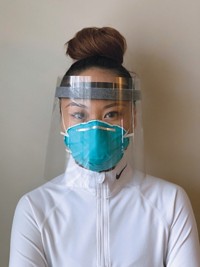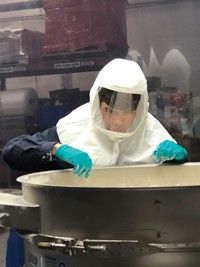Advertisement
Grab your lab coat. Let's get started
Welcome!
Welcome!
Create an account below to get 6 C&EN articles per month, receive newsletters and more - all free.
It seems this is your first time logging in online. Please enter the following information to continue.
As an ACS member you automatically get access to this site. All we need is few more details to create your reading experience.
Not you? Sign in with a different account.
Not you? Sign in with a different account.
ERROR 1
ERROR 1
ERROR 2
ERROR 2
ERROR 2
ERROR 2
ERROR 2
Password and Confirm password must match.
If you have an ACS member number, please enter it here so we can link this account to your membership. (optional)
ERROR 2
ACS values your privacy. By submitting your information, you are gaining access to C&EN and subscribing to our weekly newsletter. We use the information you provide to make your reading experience better, and we will never sell your data to third party members.
Business
Covid-19
A sigh of relief at small chemical makers
Firms have weathered the pandemic, but supply-chain disruptions may be a lingering symptom as markets revive
by Rick Mullin
July 26, 2021
| A version of this story appeared in
Volume 99, Issue 27

Office workers are back on-site, unmasked if they are vaccinated. Customer visits are resuming. Safety measures undertaken to protect lab and factory workers have succeeded. Manufacturing is at or near capacity as markets revive. Small- to medium-size US specialty and fine chemical firms have arrived at a tentative consensus: things are back to normal.
Support nonprofit science journalism
C&EN has made this story and all of its coverage of the coronavirus epidemic freely available during the outbreak to keep the public informed. To support us:
Donate Join Subscribe
In fact, much of 2020 was quite normal. CEOs who 16 months ago felt they were looking into the abyss describe a pandemic year marked by the kind of events that occur in less remarkable times—an acquisition, a lab expansion, a multisite plant renovation, a headquarters relocation, and the launch of a product line.
Still, their relief is palpable. “I was more concerned than I let you know,” says Regis Technologies CEO Louis Glunz IV, whom C&EN interviewed last year. “I thought it might spiral into one of those long recessions that we had from 2008 to 2011. But we were out pretty quickly. Way better than I would have thought.”
Kate Hampford Donahue, CEO of Hampford Research, and Beth Bosley, CEO of Boron Specialties, also express relief with how the pandemic passed, given their apprehension last March.
Ephraim S. Honig, CEO of Strem Chemicals at the time, recalls the challenge of rising above initial doom and gloom. “Imagine a cloud,” he says, remembering March of last year. “You can’t see where you’re going, you’re standing on a plank, not sure how wide the plank is. You don’t know if you take a little step to the left if you will fall into a chasm.”
Things are getting back up to speed at Strem’s facility in Newburyport, Massachusetts, says Honig, now chief science and innovation officer at Ascensus Specialties, which purchased Strem in April. Jay Dickson, CEO of Nation Ford Chemical in Fort Mill, South Carolina, reports a similar experience. “We are back to normal, and the plant is near capacity in many respects,” Dickson says.
The good news is tempered, however, by concerns over the recent increase in COVID-19 cases in the US, a development that jolted financial markets last week.
Executives say they are also dealing with an unanticipated development impacting specialty and fine chemical makers in 2021. “We expected supply-chain problems in 2020, and we didn’t see much of that,” Bosley says. “We had a little trouble getting a couple of solvents a couple of times. But we are seeing serious supply-chain trouble now—price increases and slow deliveries.”
The supply-chain stress is hard to characterize, the executives say. Freezing weather in Texas and the jamming of the Suez Canal by a stuck freighter earlier this year caused backups, but at the same time, they agree that the sector is experiencing a long-term symptom of last year’s pandemic-related supply-chain dislocation.
“What this tells us is that the supply chain in general is pretty fragile,” Bosley says. “Any one interruption will cause repercussions down the line.”
Last year began with a scramble of preparation for very rough waters. The US chemical industry received immediate support when it was deemed essential by the Department of Homeland Security in March, ensuring continued operation in instances of state or federal stay-at-home mandates.
The primary concern among executives at the outset of the pandemic was ensuring worker safety. Workers not required on-site needed to establish home offices. Lab and factory workers adopted masking and social-distancing protocols, and companies moved to split shifts to reduce the number of people on-site.
Strem acted quickly, Honig recalls. “In early March, we knew COVID was out there,” he says. “We realized something was probably going to happen, so we started to look at technology tools that would allow you to work from home, and we quickly ordered what we needed—monitors and computers—before the mad rush.” The company also stocked up on personal protective equipment.
Strem constructed clear plastic barriers around workspaces in the labs, Honig says, adding that the labs’ usual high level of air filtration was a benefit. The company kept current with government guidelines on safety, regularly communicating them to staff. “We really worked hard sharing information as it became available,” Honig says. “Oddly, the first cases of employees contracting COVID were work-from-home employees.”
Honig says the first on-site employee who contracted COVID-19 was hospitalized for 2 days, recovered fully, and returned to work. Operations continued uninterrupted. Strem was hit hard in a key market, however: chemicals for academic research. University labs shut down in March 2020 and began reopening only in October. The company got by on steady business with industrial customers, Honig says.
Communication with staff was also a top priority at Hampford Research, Hampford Donahue says. The first weeks were hectic. “Every day was triage,” she says. “We spent a lot of money on computers and printers to get everybody set up at home,” she says. “Initially, the management team was meeting every single morning. That went on [from home] for a couple of months.” She also sent a daily email to all employees with updates from the Centers for Disease Control and Prevention (CDC) and other sources.
Despite such efforts, seven employees at the firm’s office and plant in Stratford, Connecticut, including Hampford Donahue, came down with COVID-19 in March 2020. “I managed to make the morning call every morning, but it was exhausting,” she says. Hampford Donahue assumes that staff became ill because of contact at headquarters before people began working from home. “We’re a huggy company,” she says. But the first burst was the last. “Nobody got sick after the middle of April last year,” she adds.
Concerns about staff health have shifted in recent months. “It went from ‘how do we keep everybody safe?’ to ‘what’s happening with the vaccine—when can people get it?’ and really pushing people to get vaccinated,” she says. She estimates that about 90% of the firm’s staff has received the vaccine.
Nation Ford, Dickson says, has not issued a staff policy regarding vaccination, but he estimates that at least 65% of workers are vaccinated, some of them receiving their vaccine at a clinic Nation Ford set up on-site staffed by a nurse administering the Moderna vaccine. Dickson says he is following the lead of larger manufacturing companies on managing back-to-work issues for office staff.
At Nation Ford, management and office employees worked remotely during the early months of the pandemic. Everyone came back on-site in the fall, according to Dickson.

At Boron Specialties, the entire staff of seven worked on-site at the firm’s Ambridge, Pennsylvania, facility throughout the pandemic, according to Bosley. The company switched to an alternating shift schedule and converted the conference room to office space, allowing people to spread out. “The masking scenario was: unless it creates more of a hazard than it protects you, you need to wear a mask,” she says.
For chemists conducting pyrophoric chemistry, Bosley suspected that masks might indeed be more of a hazard than the virus. She says she tested the flammability of a mask commonly used in the lab by putting a match to it in her backyard. “It was bad. It lit right up,” she says, adding that workers wear face shields around flammable processes, providing a level of protection against infection. “Eventually we got flame-retardant masks,” she says.
Boron has not had visitors, and nobody has traveled since the beginning of the pandemic, Bosley says, adding that her small staff is fully vaccinated. “We didn’t have to encourage anybody to get the vaccine,” she says, noting that as an essential business working on defense contracts, workers had a good position in the queue. Bosley says that she lifted the company mask mandate in June, 2 weeks after the last employee was fully vaccinated.
Amidst the pandemic last year, Boron managed to launch a series of prepolymers for high-temperature applications. It hired two people this year, adding an eighth employee and filling a vacant position.
The only hitch has been the recent tightness in the supply chain. Boron has had trouble finding amines. Isopropyl alcohol is in short supply, she says, because of its use in making hand sanitizer. “Most solvents are on allocation—methanol, hexane. And prices have gone up,” says Bosley. Boron trichloride, which is used to manufacture the COVID-19 therapy remdesivir, has until recently been difficult to obtain, she says.
Glunz says Regis experienced the same sales dip that many pharmaceutical service companies experienced over the past year. “2020 was a down year,” he says, with business off by about 10%. “Many of our customers couldn’t recruit patients for clinical trials, and that pushed things out.”
Moreover, he says COVID-19 therapies and vaccines in development by drug companies did not generate business for Regis as he thought they might. The company looked at the technical specifications for one project but determined it could not produce the volume required.
Glunz’s anxiety about business was compounded, he says, because Regis had just added an 850 m2 process and analytical lab at its facility in Morton Grove, Illinois. But that investment is paying off now that the market is rebounding. “People want to have stuff done in America,” he says. “We have a bigger facility, and we are able to take on more projects. But recruiting great chemistry talent is a challenge.”
Production was unimpeded by the pandemic at MFG Chemical, which operates three plants in Dalton, Georgia, and one in Pasadena, Texas. An extensive renovation that started in 2019 at the Georgia plants also continued throughout the pandemic.
“We wanted to, as best as we could, keep the project alive,” CEO Paul Turgeon says. “We created physically separated operating areas for delivered goods. And we had contractors on-site with extreme oversight.” The 18-month project, which included installation of a digital control system and an open, recirculating cooling system, was completed in April of this year. The renovations boosted capacity at the Dalton plants by about 25%, Turgeon says.
Other visitors were also allowed on-site. And MFG employees able to work from home were back after only about 5 weeks, Turgeon says. “We were back early and careful with social distancing and workplace practices.” Employees had to sign in, and temperatures were checked. Standard masking and social-distancing practices were enforced. “Some came down with COVID, myself included,” Turgeon says. “But all cases were traced, and all resulted from third-party outside interactions, we believe.”
MFG also moved its headquarters from Dalton to Chattanooga, Tennessee, about 50 km away, in 2020. Fifteen people, including top management, moved to the new downtown offices.
The company, which primarily serves water treatment, oil and gas, and surfactant markets, saw its business hurt by the pandemic—“Demand stopped because the world stopped,” Turgeon says—and by the ice storm in Texas. But recent months have brought a significant rebound.
“A lot of it is probably real,” Turgeon says of the uptick in business. But he suspects that some companies are only rebuilding inventory after the supply dislocations.
Like many specialty chemical makers, MFG is a member of the Society of Chemical Manufacturers and Affiliates (SOCMA), a trade association for specialty and fine chemical companies. CEO Jennifer Abril says SOCMA leaders realized as early as March 2020 that they needed to create a COVID-19 information hub for members.
“Our first discussions early on were about how to keep businesses across the supply chain open and operating,” Abril says. SOCMA provided daily updates from the CDC, state authorities, and other sources on a COVID-19 page on its website. The association convened a plant manager roundtable for sharing site-preparation practices and scheduled weekly webinars on COVID-19 policy updates.
Abril says SOCMA members initially expected the bottom to fall out of business last year, but most suffered downturns only in the third quarter. “It’s the rare company that had two down quarters,” she said. SOCMA is not aware of any company having to discontinue operations because of instances of COVID-19 on-site.
Advertisement
This year is presenting challenges, however. In addition to supply-chain problems, members are having a hard time hiring staff as markets revitalize. “I know one company in rural Georgia that is paying $20 an hour for entry level, compared to $16 an hour for entry level in Newark, New Jersey,” Abril says.
Looking ahead, Turgeon says the uptick in COVID-19 cases spurred by the highly contagious Delta variant is not likely to impede business. “My concern level is on the lower side,” he says. “I personally feel the Delta variant will drive a higher result on vaccinations, which should calm things down.”
Bosley and Hampford Donahue are more concerned. Both say their companies may go back to a mask mandate if case numbers increase significantly. And Hampford Donohue says her management team has decided to continue meeting twice a week to discuss pandemic developments due to the rise in cases.





Join the conversation
Contact the reporter
Submit a Letter to the Editor for publication
Engage with us on Twitter